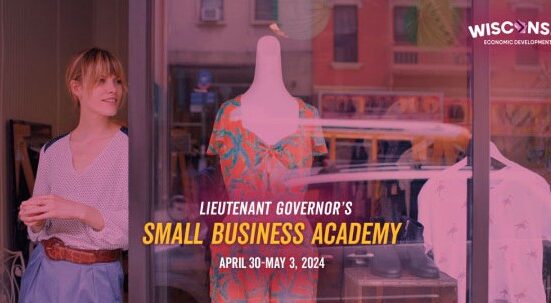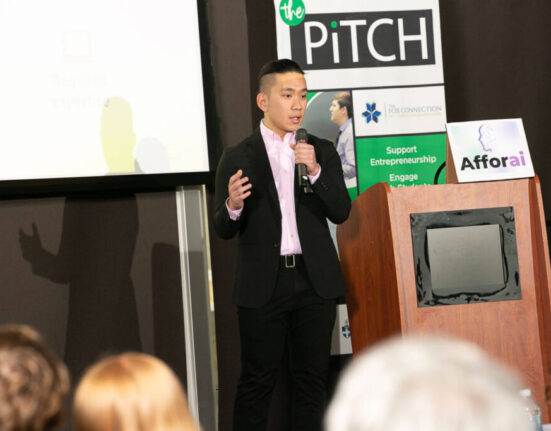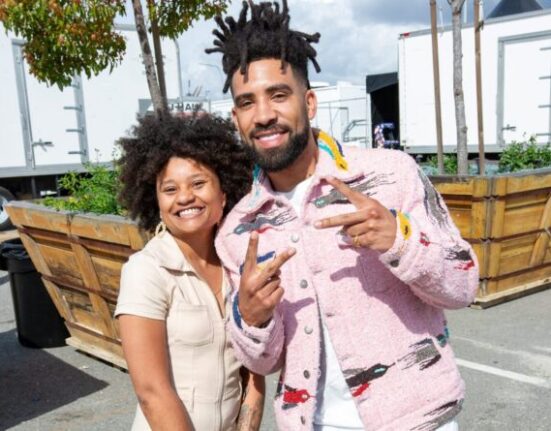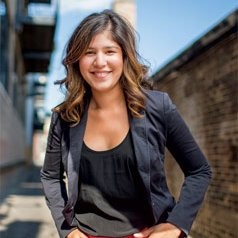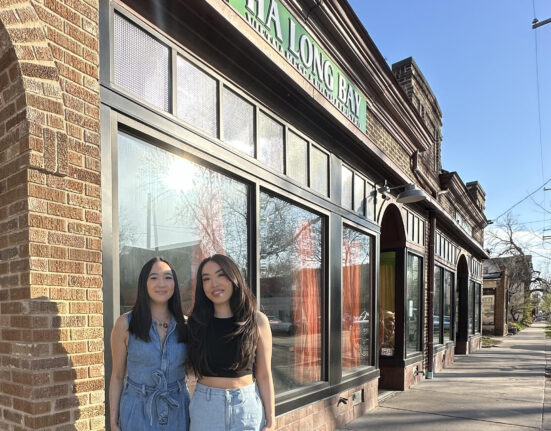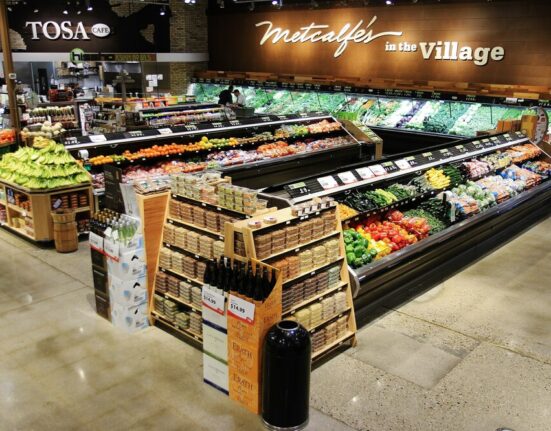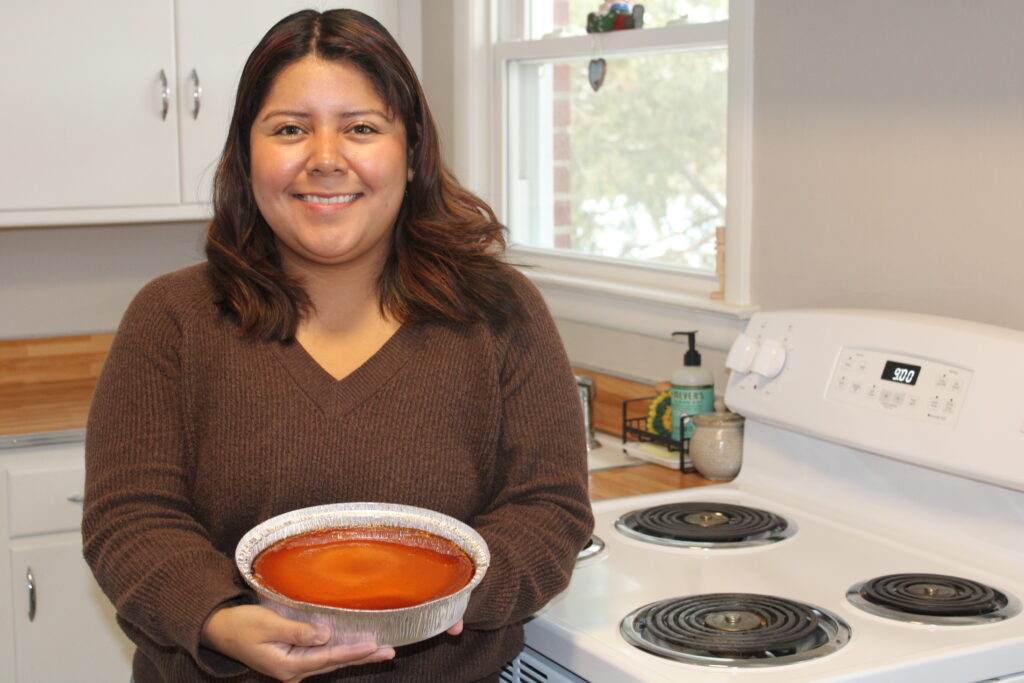
“The caramel is everything.”
That’s what Karen Perez-Wilson says when asked what makes the perfect flan.
Perez-Wilson, a second-year law student at the University of Wisconsin, has been supporting her education for the last year or so by making and selling flan, the traditional Mexican custard dessert, in her South Side apartment.
Born in Veracruz, Mexico, Perez-Wilson has spent most of her life in Madison.
“This is what I consider home,” she told Blueprint365. “I was raised in Madison, I went here for undergrad. I started at Madison College and then transferred to UW Madison and got my degree.”
Always interested in numbers and personal finance, Perez-Wilson thought her path would be into business.
“I actually thought I was going to go to business school. I had taken all the requirements (and) pretty much finished the application,” she said. “And then the day before, it was like, ‘I don’t think this is for me.’”
Going back to her days as a student at Madison West, she’d often been involved in organizing and advocating for Latino people, especially the undocumented.
“I did a lot of community organizing, and I would go to DC and work with other community organizers from different parts of the country,” she said. “I was doing some community organizing here back home just independently with some friends I went to high school with, and we would organize rallies and workshops and stuff like that. So that’s when I started thinking about law school … the more I started to get involved with community organizing, and being a first generation student, it was really just ingrained in me that everyone can take so much from me. They can take your car, they can take your house, whatever, but they can never take your education. Being from a minoritized community, I’ve seen how we’ve been sometimes taken advantage of by not knowing our rights. I feel like that was always something that just caused a spark in me to just run with it. And I became passionate about the law. I’m passionate about advocating for people who were also minoritized. I’ve been doing that my whole life with myself and my parents. …. I was the first one to graduate from high school. So that was pretty surreal. And then the first one to graduate from college. And it was like, Okay, this is insane. And now to be, in a year and a half, the first attorney in my family, it’s pretty surreal.”
Like many small business owners, hers got its start shortly after the COVID-19 pandemic ground the economy to a halt. She’d already become known in her friend group for her flan.
“It was always something that I thought about in the back of my head, but never really did anything about. Whenever my friends would have parties, I would always be the one that would take flan to those parties. And then they kind of sparked that idea and said, ‘You should really sell this,’” she recalled. And the joke was that she’d call the venture “Your Biggest Flan.”
She didn’t grow up eating a lot of flan, but her grandmother made many other Mexican delicacies and taught Perez-Wilson to cook.
“My grandma used to make us pan dulce all of the traditional Mexican pastries. But we didn’t eat flan growing up. I never saw her make it, so it was just me really just putting things together,” Perez-Wilson said. “My grandma used to always tell me, when I would ask for measurements, she’s like, ‘you don’t do that here. Your ancestors will tell you when to stop’ … it was really me saying, okay, let’s add one more egg or let’s add a little bit more sugar or just playing around with things.”
Early in the summer of 2020, “it was just me at home, studying for the LSAT, but also just saying, ‘Okay, I’m gonna make this and see.’ And I put it online on Facebook, and then started to get orders. And I remember feeling super nervous about it.”
And yes, she called it “Your Biggest Flan.”
Since then, she estimates she’s sold about 350 of the pie-sized desserts for $25 each, almost exclusively by taking orders via Facebook Messenger. Recently she’s been making eight to 12 every week.
“It took a while for me to get into a routine. But now I know how much time it takes to make them, and I know how to manage my time to make sure that they’re all ready by Saturday morning when people start picking them up,” she said. “I’m getting to meet a lot of new people who weren’t in my immediate circle, but now have just been people who have found out about the business and wanted to support it … I had a person from Ireland who had a host family in Madison. And she put an order in because she wanted to surprise her host parents. I was able to deliver that to them and they were just so happy. And then I had a friend who was living out in California who wanted to do the same thing for her parents who live really near (to Madison).”
In addition to making extra money and connecting with customers, Perez-Wilson said it’s a way to connect to her own culture.
“My happiest, most memorable moments were with my family members eating. And there’s just something that always takes me back to a moment that I spent with my grandma,” Perez-Wilson said. “She was the one that did a lot of the cooking growing up. It’s a bridge. It’s a bridge to my grandma. It’s a connection. It’s a bridge to my culture. And for me, that’s so important.”
She advises anyone with an idea and a dream to give entrepreneurship a try.
“Really take that risk. You never know if you don’t try,” she said. “It’s a very scary thing, but sometimes you just have to take that jump, because there’s always people willing to just be your biggest fans. It’s always been about doing things that scare you, because so much good comes from that. I’ve seen it play out in my life time and time again. It was so scary to go to law school, but now I’m doing it. It was so scary to start this business and I’m doing it, and it opens opportunities.”
Now, with three semesters left in law school, Perez-Wilson is open to going into both legal practice and food production.
“I’ve always thought I can be several things,” she said. “I have so many dreams. Why limit myself?”

